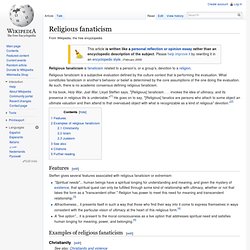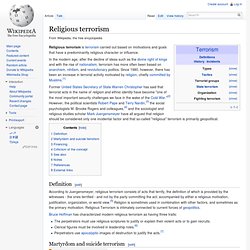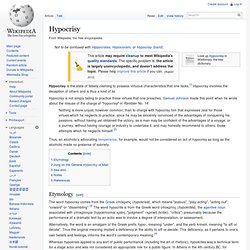

Pride. Pride is sometimes viewed as excessive or as a vice, sometimes as proper or as a virtue.

While some philosophers such as Aristotle (and George Bernard Shaw) consider pride a profound virtue, some world religions consider it a sin, such as is expressed in Proverbs 11:2 of the Old Testament. In Christianity, pride is one of the Seven Deadly Sins. According to the Concise Oxford Dictionary, proud comes from late Old English prut, probably from Old French prud "brave, valiant" (11th century) (which became preux in French), from Late Latin term prodis "useful", which is compared with the Latin prodesse "be of use".[4] The sense of "having a high opinion of oneself", not in French, may reflect the Anglo-Saxons' opinion of the Norman knights who called themselves "proud", like the French knights preux. Nihilism. Nihilism is also a characteristic that has been ascribed to time periods: for example, Jean Baudrillard and others have called postmodernity a nihilistic epoch,[4] and some Christian theologians and figures of religious authority have asserted that postmodernity[5] and many aspects of modernity[3] represent a rejection of theism, and that such rejection of their theistic doctrine entails nihilism.

Forms of nihilism[edit] Nihilism has many definitions, and thus can describe philosophical positions that are arguably independent. Vanity. In conventional parlance, vanity is the excessive belief in one's own abilities or attractiveness to others.

Prior to the 14th century it did not have such narcissistic undertones, and merely meant futility.[1] The related term vainglory is now often seen as an archaic synonym for vanity, but originally meant boasting in vain, i.e. unjustified boasting;[2] although glory is now seen as having an exclusively positive meaning, the Latin term gloria (from which it derives) roughly means boasting, and was often used as a negative criticism.[3] Religious fanaticism. Religious fanaticism is fanaticism related to a person's, or a group's, devotion to a religion.

Religious fanaticism is a subjective evaluation defined by the culture context that is performing the evaluation. What constitutes fanaticism in another's behavior or belief is determined by the core assumptions of the one doing the evaluation. As such, there is no academic consensus defining religious fanaticism. In his book, Holy War, Just War, Lloyd Steffen says, "[Religious] fanaticism . . . invokes the idea of ultimacy, and its presence in religious life is undeniable. Religious terrorism. Religious terrorism is terrorism carried out based on motivations and goals that have a predominantly religious character or influence.

In the modern age, after the decline of ideas such as the divine right of kings and with the rise of nationalism, terrorism has more often been based on anarchism, nihilism, and revolutionary politics. Since 1980, however, there has been an increase in terrorist activity motivated by religion, chiefly committed by Muslims.[1] Former United States Secretary of State Warren Christopher has said that terrorist acts in the name of religion and ethnic identity have become "one of the most important security challenges we face in the wake of the Cold War.
"[2] However, the political scientists Robert Pape and Terry Nardin,[3] the social psychologists M. Definition[edit] Religious violence. Religious violence is a term that covers phenomena where religion, in its diversity, is either the subject or object of violent behavior.[1] Religious violence is, specifically, violence that is motivated by or in reaction to religious precepts, texts, or doctrines.

This includes violence against religious institutions, persons, objects, or when the violence is motivated to some degree by some religious aspect of the target or precept of the attacker. Religious violence does not refer exclusively to acts committed by religious groups, but also includes acts committed by secular groups against religious groups. Superstition. Clay hamsa on a wall, believed to protect the inhabitants of the house from harm Superstition is the belief in supernatural causality—that one event leads to the cause of another without any natural process linking the two events—such as astrology, religion, omens, witchcraft, etc., that contradicts natural science.[1] The word superstition is sometimes used to refer to religious practices (e.g., Voodoo) other than the one prevailing in a given society (e.g., Christianity in western culture), although the prevailing religion may contain just as many superstitious beliefs.[1] It is also commonly applied to beliefs and practices surrounding luck, prophecy and spiritual beings, particularly the belief that future events can be foretold by specific (apparently) unrelated prior events.[3] Etymology[edit] Black cats are considered bad luck in some cultures The word superstition is first used in English in the 15th century, modelled after an earlier French superstition.

Sect. A Catalogue of the Severall Sects and Opinions in England and other Nations: With a briefe Rehearsall of their false and dangerous Tenents.

Broadsheet. 1647 A sect is a subgroup of a religious, political or philosophical belief system, usually an offshoot of a larger religious group. Although in past it was mostly used to refer to religious groups, it has since expanded and in modern culture can refer to any organization that breaks away from a larger one to follow a different set of rules and principles. The term is occasionally used in a malicious way to suggest the broken-off group follows a more negative path than the original.
Hypocrisy. Hypocrisy is the state of falsely claiming to possess virtuous characteristics that one lacks.[1] Hypocrisy involves the deception of others and is thus a kind of lie.

Hypocrisy is not simply failing to practice those virtues that one preaches. Samuel Johnson made this point when he wrote about the misuse of the charge of "hypocrisy" in Rambler No. 14: Sexual capital. Origins[edit] The term erotic capital was first used by British sociologist Catherine Hakim in the early 2000s.

Hakim defined it as separate from and building upon French sociologist Pierre Bourdieu's concepts of economic, cultural and social capital. She says erotic capital is independent of class origin and therefore enables social mobility, and argues that makes erotic capital socially subversive, which results in the prevailing power structures devaluing and trying to suppress it.[1] Egotism. Egotism is the drive to maintain and enhance favorable views of oneself, and generally features an inflated opinion of one's personal features and importance—intellectual, physical, social and other.[1] The egotist has an overwhelming sense of the centrality of the 'Me': of their personal qualities.[2] Egotism means placing oneself at the core of one's world with no concern for others, including those loved or considered as "close," in any other terms except those set by the egotist.
Characteristics[edit] Egotism differs from both altruism - or acting to gain fewer values than are being given– and from egoism, the unremitting pursuit of one's own self-interest. Narcissism. Narcissism is a concept in psychoanalytic theory, introduced in Sigmund Freud's On Narcissism. The American Psychiatric Association has the classification narcissistic personality disorder in its Diagnostic and Statistical Manual of Mental Disorders (DSM). Narcissism is also considered a social or cultural problem. It is a factor in trait theory used in some self-report inventories of personality such as the Millon Clinical Multiaxial Inventory. It is one of the three dark triadic personality traits (the others being psychopathy and Machiavellianism).
Bigotry. Etymology[edit] The origin of the word bigot and bigoterie (bigotry) in English dates back to at least 1598, via Middle French, and started with the sense of "religious hypocrite". This meaning still survives in Italian, in the cognate word bigotto. The exact origin of the word is unknown, but it may have come from the German bei and Gott, or the English by God. Delusion. A delusion is a belief held with strong conviction despite superior evidence to the contrary.[1] As a pathology, it is distinct from a belief based on false or incomplete information, confabulation, dogma, illusion, or other effects of perception.
Delusions typically occur in the context of neurological or mental illness, although they are not tied to any particular disease and have been found to occur in the context of many pathological states (both physical and mental). However, they are of particular diagnostic importance in psychotic disorders including schizophrenia, paraphrenia, manic episodes of bipolar disorder, and psychotic depression. Definition[edit] Although non-specific concepts of madness have been around for several thousand years, the psychiatrist and philosopher Karl Jaspers was the first to define the three main criteria for a belief to be considered delusional in his 1913 book General Psychopathology.[2] These criteria are: Bigotry Watch. Narcissisme. Un article de Wikipédia, l'encyclopédie libre. Le narcissisme est le fondement de la confiance en soi.
Lorsqu'il est défaillant, le terme peut désigner l'importance excessive accordée à l'image de soi. Le dictionnaire commun le définit comme « contemplation de soi ou attention exclusive portée à soi. » Orgueil. Fierté. Un article de Wikipédia, l'encyclopédie libre. Sur les autres projets Wikimedia : Fanatisme. Obsession (médecine) Secte. Un article de Wikipédia, l'encyclopédie libre. Cependant, ce terme a pris une dimension polémique, et désigne de nos jours un groupe ou une organisation, le plus souvent à connotation religieuse, dont les croyances ou le comportement sont jugés obscurs ou malveillants par le reste de la société.
Généralement, les responsables de ces groupes sont accusés d'une part de brimer les libertés individuelles au sein du groupe ou de manipuler mentalement leurs disciples, afin de s'approprier leurs biens et de les maintenir sous contrôle, et d'autre part d'être une menace pour l'ordre social. Cette connotation négative de « secte » est récusée par la plupart des groupes visés, ainsi que par certains juristes et sociologues. Sectes historiques et hérésies[modifier | modifier le code] Protagonistes du débat sur les sectes en France. Catégorie:Débat sur les dérives sectaires. Catégorie:Critique des croyances. Nihilisme. Un article de Wikipédia, l'encyclopédie libre. Le nihilisme (du latin nihil, « rien ») est un point de vue philosophique d'après lequel le monde (et plus particulièrement l'existence humaine) est dénué de tout sens, de tout but, de toute vérité compréhensible ou encore de toutes valeurs. So You've Decided to be Evil.
A Step-by-Step Guide to joining the Forces of Darkness Congratulations on your decision to join the forces of darkness! Evil always needs more tools... I mean... agents... for its unholy army of the night, and by joining now you can rest assured that your remaining years will be spent pursuing the 'good' things of life: lust, greed, debauchery, the slaughter of hapless innocents... Your favorite hobby can become a lifelong career! Acedia. Bigoterie. Délire. Superstition fr. Ignorance. Vincible ignorance. Intrusive thoughts. Ignorance. Fanaticism.